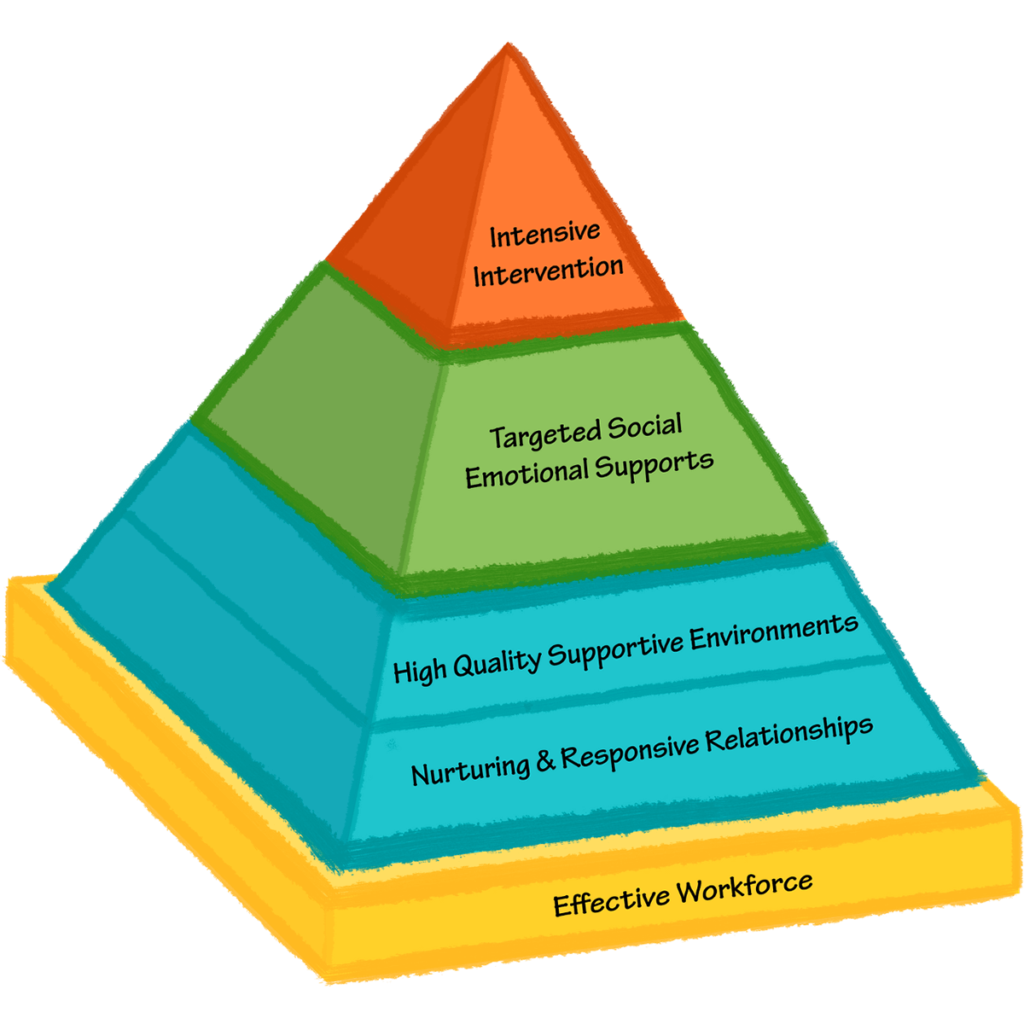The Early Childhood Pyramid Model Training
Get Pyramid Model Training and Coaching
Child Care Council Inc. is recruiting programs who may be interested in implementing this exciting initiative. Implementation provides a comprehensive approach to Pyramid which will include training and coaching.
What You Should Know
The Pyramid Model is a conceptual framework of evidence- based practices for promoting young children’s healthy social and emotional development.
The Pyramid Model provides guidance for:
- early childhood special education personnel
- early intervention personnel
- early educators
- families
- other professionals
Based on over a decade of evaluation data, the Pyramid Model has shown to be a sound framework for early care and education systems. The Pyramid Model builds upon a tiered public health approach to providing universal supports to all children to promote wellness, targeted services to those who need more support, and intensive services to those who need them.
Understanding The Process
Explaining The Pyramid Model Tiers
| Tier | Description |
|---|---|
| Foundation Supporting Pyramid Model | The model is supported at the foundation by an effective workforce. The foundation for all of the practices in the pyramid model are the systems and policies necessary to ensure a workforce able to adopt and sustain these evidence-based practices. |
| Tier 1 Universal Promotion | Universal supports for all children through nurturing and responsive relationships and high quality environments. at the universal level we include the practices needed to ensure the promotion of the social development of all children. |
| Tier 2 Secondary Prevention | Prevention which represents practices that are targeted social emotional strategies to prevent problems. The prevention level includes the provision of targeted supports to children at risk of challenging behavior. |
| Tier 3 Tertiary Intervention | Intervention which is comprised of practices related to individualized intensive interventions. The tertiary level of the pyramid model describes the need to provide individualized and intensive interventions to the very small number of children with persistent challenges. |
Pyramid In Your Program
Program-wide implementation of the Pyramid Model refers to a systematic effort within a program for Pyramid Model implementation fidelity. In program-wide implementation, a leadership team guides the implementation process and develops the supports and infrastructure needed to ensure that evidence based practices promoted by the Pyramid Model are implemented to the degree necessary to ensure best outcomes for children and families. Implementation to fidelity is at least a three to five year project with supports offered through New York State for training and leadership coaching.
Evidence-based practices are effective only when implemented with fidelity. Program-wide implementation sites are first assessed as a whole using the Benchmarks of Quality which guides the leadership team with action steps to full implementation. Then specific classroom observation tools are used such as the Teaching Pyramid Observation Tool (TPOT) and Teaching Pyramid for Infants/Toddlers Observation Scale (TPITOS). The results from these observation tools guide Practice-Based Coaching that supports classroom teachers and programs to integrate the use of evidence-based practices into teaching and caregiving.
What & Why?
Team Leadership: A representative leadership team works to ensure the program has a team to provide individualized behavior supports to children, professional development and support to teachers and a plan for family engagement. This team uses data to make decisions as they guide implementation.
Family Engagement: The program partners with families by establishing collaborative partnerships, providing families with information and support in guiding children’s development of social and emotional skills, and collaboratively teaming to support individual children.
Program-Wide Expectations: Adoption of program-wide expectations provides a shared focus and shared language for describing behavior expectations to children, staff, and families Expectations are posted in all areas of the program and shared with families. Children receive frequent developmentally appropriate feedback and guidance as they are taught to meet program expectations.
Staff Professional Development and Support: Training and coaching/ support are necessary to effectively implement the Pyramid practices. The leadership team, and the program coach develop strategies to provide ongoing support to staff.
Classroom Implementation: Coaches use observational tools ( above) to provide teachers with feedback and guidance. Through Practice Based Coaching, teachers are supported to use practices to ensure children succeed.
Behavior Support: Policies and procedures are developed for providing support to staff to address challenging behavior. Examples: support in crisis situations, use of problem soling processes for children, a consistent system for identifying children who need a behavior support plan, etc.
There is clear evidence that training alone doesn’ t change teacher practices to the level needed to ensure success for all children. The Pyramid Model provides a consistent framework used in early childhood environments to support teachers so they feel competent and confident while using best practices in their classrooms.
Research Shows
Children have better social skills and less problem behavior in pyramid model classrooms.
Teachers are able to implement pyramid model practices better if they receive training and practice-based coaching.
Bringing Pyramid To Your Program
The Pyramid Model is designed to provide strategies for encouraging healthy social-emotional development and a strong foundation for all children, with increasing levels of support for children who need additional interventions. By signing on to implement Pyramid you become a part of this foundation!
With the support of a team of knowledgeable professionals you will:
- participate in staff pyramid model training on the Tiers, specific to that age group
- learn and implement strategies to address and support children with challenging behaviors
- gain access to classroom supports, materials and resources to use in your program/classroom
- receive coaching and guidance from specialists as you institute system changes to support children and classrooms
- assess classrooms/programs using screening and evaluation tools to identify areas of strength and areas for growth.
View Our Padlet Resources
Ready to Get Started?
For more information, please contact your local CCRR or Rose Shufelt, Region 2 Pyramid Hub Coordinator/Master Cadre Trainer/Coach at [email protected] -or- Cat Turco, Infant/Toddler Specialist, CCRR Trainer and Coach at [email protected]








